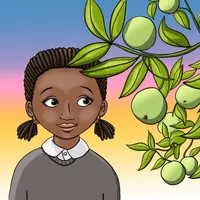(Khalai talks to plants) خَلَايْ تَتَحَدَّثُ إِلَى النَّبَات
Khalai|talks|to|plants|Khalai|talks|to|plants
(Khalai spricht mit Pflanzen)
(Khalai talks to plants)
(Khalai habla con las plantas)
(Khalai parle aux plantes)
(Khalai parla alle piante)
(칼라이가 식물에게 말을 건다)
(Khalai praat met planten)
(Khalai rozmawia z roślinami)
(Khalai fala com plantas)
(Халаи разговаривает с растениями)
(Khalai bitkilerle konuşuyor)
(卡莱与植物对话)
هَذِهِ خَلَايْ.
these|cells
These are my cells.
عُمُرُهَا سَبْعُ سِنِينَ.
Her age is|seven|years old
Sie ist sieben Jahre alt.
She is seven years old.
مَعْنَى اِسْمِهَا “الشَّخْصُ الجَيِّدُ”.
meaning|Her name|the person|the good person
Die Bedeutung ihres Namens ist „guter Mensch“.
Her name means “a good person.”
يُدْعَى فِي لُغَتِهَا “لُوبُوكُوزُو”.
is called|in|her language|Lobokozu
In seiner Sprache heißt es „Lobukozo“.
In her language, it is called “Lobokozo”.
تَسْتَيْقِظُ خَلَايْ كُلَّ صَبَاحٍ وَتَقُولُ لِشَجَرَةِ البُرْتُقَالِ: “أَرْجُوكِ يَا شَجَرَةَ البُرْتُقَالِ، اكْبَرِي، وَاعْطِنَا الكَثِيرَ مِنَ البُرْتُقَالِ الطًازَجِ”.
"Wakes up"|I|every|morning|and says|to the tree|orange tree|please|O|orange tree|orange tree|grow bigger|give us|a lot|of|oranges|fresh
Jeden Morgen wacht Khali auf und sagt zum Orangenbaum: „Bitte, Orangenbaum, werde erwachsen und gib uns viele frische Orangen.“
She gets up every morning and says to the orange tree, "Please, orange tree, grow up, and give us plenty of oranges."
تَمْشِي خَلَايْ إِلَى المَدْرَسَةِ، وَفِي طَرِيقِهَا تَتَحَدَّثُ مَعَ الأَعْشَابِ.
walks|||the school|and on|her way|talks to|with|herbs
Khali walks to school, and on the way she talks to herbs.
“أَرْجُوكِ أَيَّتُهَا الأَعْشَابُ، اكْبَرِي وَابْقَيْ خَضْرَاءَ وَلَا تَجُفّيِ”.
I beg you|"O"|The herbs|grow larger|"and stay"|green and fresh|"and do not"|"do not wither"
“Please, O weeds, grow and remain green, and do not wither.”
تَمُرُّ خَلَايْ أَمَامَ الأَزْهَارِ البَرِّيَّةِ.
pass by|bees|in front of|the wildflowers|wildflowers
Meine Zelle geht an den wilden Blumen vorbei.
My cell passes in front of the wild flowers.
“أَرْجُوكِ أَيَّتُهَا الأَزْهَارُ، اِبْقَيْ مُزْهِرَةً لِأَسْتَطِيعَ أَنْ أَضَعَكِ فَوْقَ شَعْرِي”.
I beg you|"O"|the flowers|Stay|"blooming"|"so I can"|to|place you|on top of|my hair
„Bitte, Blumen, bleib blühen, damit ich dich in meinen Haaren tragen kann.“
“Please, O flowers, stay blooming so that I can put you in my hair.”
"S'il vous plaît, ô fleurs, restez fleuries pour que je puisse vous mettre dans mes cheveux."
فِي المَدْرَسِةِ، تَتَحَدَّثُ خَلَايْ مَعَ الشَّجَرَةِ التِي فِي مُنْتَصَفِ المَبْنَى.
|the school|she talks|cells|with|the tree|which is in||middle of|the building
In der Schule kommuniziert mein Handy mit dem Baum in der Mitte des Gebäudes.
At school, my cell talks to the tree in the middle of the building.
“أَرْجُوكِ أَيَتُهَا اَلشَّجَرَةُ، مُدِّي أَغْصانَكِ الكَبيرَةَ لِنَسْتَطيعَ اَلقِراءَةَ تَحْتَ ظِلِكِ”.
I beg you|"O"|The tree|Extend|your large branches|large|"so we can"|the reading|under the shade|your shade
„Bitte, Baum, strecke deine großen Äste aus, damit wir unter deinem Schatten lesen können.“
“Please, tree, stretch out your great branches so that we can read under your shadow.”
تَتَحَدَثُ خَلَايْ مَع اَلشُّجيراتِ الصَّغيرَةِ.
"talks"||with|the small bushes|the small shrubs
Mein Handy spricht mit den jungen Büschen.
My cells talk to the little bushes.
Mes cellules parlent aux petits buissons.
“أَرجوكِ، اِكْبَري وَكُونِي قَويَّةً لِتَمْنَعِي الأَشْخَاصَ السيِّئينَ مِنَ اَلدُخُولِ”.
"Please"|Grow up|"and be"|strong|"to prevent"|people|bad people|from entering|the entry
„Bitte werden Sie erwachsen und seien Sie stark, um zu verhindern, dass böse Menschen eindringen.“
“Please, grow up and be strong to prevent bad people from entering.”
عِنْدَمَا تَعَودُ خَلَايْ إِلَى البَيْتِ، تَزُورُ شَجَرَةَ اَلبُرتُقالِ، وتَسْأَلُهَا: “أَلَمْ يُصْبِحْ بُرْتُقَالِكِ طَازَجًا بَعْدُ؟”.
"When"|return|||the house|"visits" or "she visits"|orange tree|orange tree|"and ask it"|"Hasn't"|"become"|your oranges fresh|fresh yet|"yet"
Als Khalai nach Hause zurückkehrt, besucht sie den Orangenbaum und fragt ihn: „Sind deine Orangen noch nicht frisch?“
When Khali returns home, she visits the orange tree, and asks her, "Aren't your oranges fresh yet?"
تَتَنَهَّدُ خَلَايْ: “اَلبُرْتُقالُ لَازَالَ أَخْضَراً”.
"Sighs"||The orange|still|still green
Khali seufzte. „Die Orangen sind immer noch grün.“
Khali sighs. "The oranges are still green."
ثُمَّ تَقُولُ: “سَوفَ أَرَاكِ يَا شَجَرَةَ اَلبُرْتُقَالَ غَداً، بَعْدَهَا رُبَّمَا سَيكُونُ لَدَيْكِ بُرْتُقَالاً طَازَجاً لِي”.
"Then"|"she says"|will|"I'll see you"||tree|orange tree|"tomorrow"|"after that"|"maybe"|"will have"|"you have"|fresh oranges for|fresh oranges|"for me"
Dann sagt sie: „Wir sehen uns morgen, Orangenbaum, und dann hast du vielleicht frische Orangen für mich.“
Then she says, "I'll see you, orange tree, tomorrow, then maybe you'll have fresh oranges for me."

